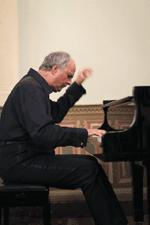> [Archived] Chronicles

The Sighișoara Music Academy Has Turned 20
It has become customary for the first day in the month of August to be the opening day of the Music Academy in Sighișoara, a festival which was founded and is being run by the experienced violinist Alexandru Gavrilovici, a man who has been living in Switzerland for a lifetime, but who holds, to this day, numerous close ties to 'home', former colleagues, and his collaborators living abroad, most of which are exercising their professions in Switzerland as well. And this is why the Festival, which is backed financially primarily by Swiss companies, opens on the Swiss National Day, on August 1st. It has also become customary for the event to take place in the presence of the Swiss ambassador Jean-Hubert Lebel, who celebrates his National Day in the medieval citadel, alongside musicians, special invitees and other officials. On its 20th edition, the Academy has counted among its attendants, for the first time, the Romanian Minister of Culture, Daniel Barbu. The minister took part in a dialogue on the evolution of the festival and the potential for collaborations for its future editions, and he spectated the 'prelude' of the musical offerings of the festival, the short alpine horn recital held by Christian Holenstein, who brought his instrument that's very similar to our very own 'bucium' to Sighișoara. After holding a short series of speeches in the elegant auditorium of the Town Hall, the minister, alongside mayor Ioan-Dorin Dăneșan, ambassador Lebel and a numerous public, watched a programme full of significance; from the audience, composer Roland Moser wanted to surprise everyone, offering an adaptation for piano, violin, and cello of the 19th century Psalm which would later become the hymn of Switzerland, followed by a performance of one of his own works for solo cello, composed only with 'natural sounds' (as the audience was told by the soloist, Katharina Gohl-Moser, the composer's wife), which recreated, by a strange coincidence, the sonorities of the bucium/alpine horn. Following this performance, violinist Alexandru Gavrilovici and pianist Viniciu Moroianu took to the stage and performed an Adagio composed by R. Moser in a manner reminiscent of the the golden age, with humming 'modules' completing each other in a simple yet sensitive dialogue, intertwined at times with percussive rhythms. The two performers also tackled Constantin Silvestri's Sonata no.2, op. 19, thus honouring, through a composition that was particularly interesting but unfortunately omitted from most present day recitals, both the centenary of the illustrious musician's birth, as well as the presence of a Romanian composition in a joint Romanian-Swiss Festival.
Then, after the break, in a total change of atmosphere and... content, Viniciu Moroianu delighted and even impressed the public with his performance of the 33 Variations by Beethoven on a Theme by Diabelli, a large opus, difficult and demanding, a perfectly balanced and logical composition that underlines clearly, but without ostentation, the contrasting musical planes, moving from the speed of the more expansive sections to the discreetness and finesse of the more delicate and introspective sections, all the while adding surprising and endearing interpretative elements, such as the long pedal action which created an unsettling feeling of 'suspension in time'. Expressiveness and the high technical ability of the musician reigned supreme throughout the performance, which was enthralling even to those less familiar with such elevated opuses; and the best proof of this is the absolute 'silence' and concentration that took over the room for over an hour. At the end, the performer received a standing ovation, and rewarded the public in turn with two magnificent encores, one of which was an early work by Wagner, which was far from what would later become the unmistakeable style of the composer from Bayreuth, and more reminiscent of Schumann's works. Without a doubt, the pianist would have continued to play, and we would have continued to listen to other works in his interpretation, and with great joy...
It was an auspicious opening, marked by the presence of important officials (who attended the festival in greater numbers than ever before from all across the county), as well as musicians who, for the following few days, were both soloists and professors to disciples from all across Europe; they were all reunited in the great family of the Academy, which, on its 20th birthday, has 'grown' immensely, but seems younger than ever, just like the people who created it and continue to nurture it, with passion and enthusiasm.
Translated by Șerban Dudău and Elena Daniela Radu
MTTLC, The University of Bucharest














